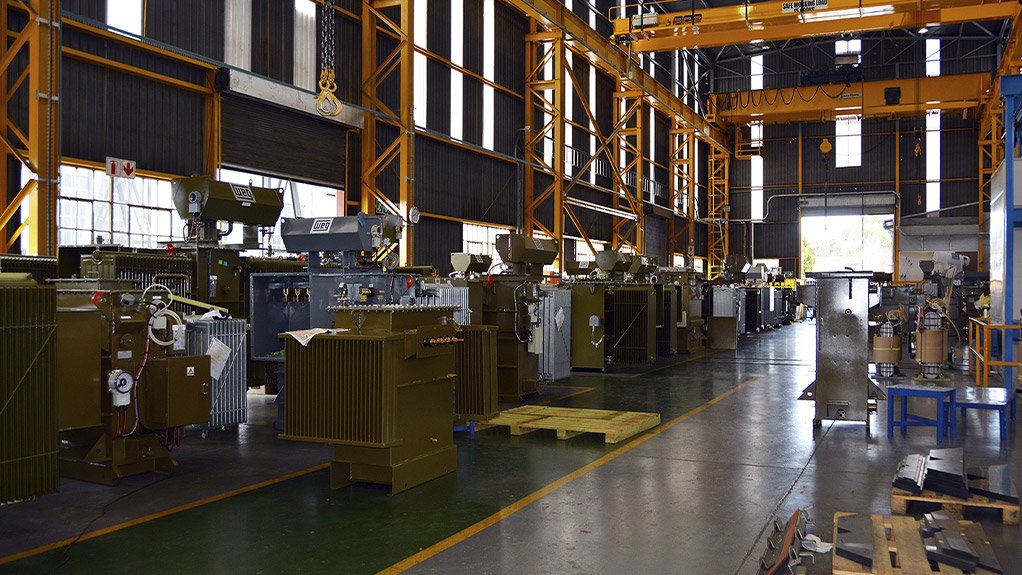
Local transformer manufacturing at Zest WEG's facility in Wadeville
Over the past 12 years Zest WEG, the South African subsidiary of Brazilian motor and controls manufacturer WEG, has evolved from being primarily a sales and distribution company to a fully-fledged manufacturer working to the best global standards.
“In 2010 WEG acquired a majority shareholding in Zest, which was the WEG distributor in South Africa,” explains Eduardo Werninghaus, newly appoint Group CEO of Zest WEG. “While Zest had some manufacturing capability, its focus was on distributing WEG’s range in the sub-Saharan market. Once WEG assumed control, the decision was taken to progressively expand the company’s local manufacturing capability.”
As Werninghaus points out, WEG, founded in 1961, is a truly global manufacturer with factories on all five continents. “In all, WEG manufactures in 12 countries outside of Brazil and the plants in these countries account for almost 50% of WEG’s production. Manufacturing is in WEG’s DNA and is now part of the DNA of the South African operation. Currently our manufacturing sites in South Africa are able to produce a wide range of equipment with varying levels of local content – more than 90% in the case of transformers and close to 70% for panels and E-Houses.”
In Gauteng Zest WEG has two transformer manufacturing facilities. One is in Wadeville and the other in Heidelberg. “These facilities were acquired when we bought out two local manufacturers in 2013 and in 2015,” says Werninghaus. “As a result, we now have the capability to locally manufacture transformers up to 45 MVA capacity.”
Zest WEG has upgraded and extended the facilities, which are now equipped with state-of-the-art equipment including an impulse voltage generator at the Heidelberg factory which allows the in-house testing of transformers.
Also in Gauteng, Zest WEG – through its automation division – produces a wide range of electrical panels in Robertsham and E-Houses and electrical enclosures in Heidelberg.
In Cape Town, the company has a genset factory and a panel manufacturing facility. The genset site is dedicated to producing custom-engineered gensets and is complemented by an assembly line at Zest WEG’s headquarters in Longlake, Johannesburg, which assembles boxed gensets and gear motors.
Werninghaus emphasises that Zest WEG has put a huge effort into building up a network of local suppliers, who contribute to the manufacturing process.
“We don’t do this merely to meet government-mandated targets on local procurement but because it is something that WEG has always done,” notes Werninghaus. “The company started up in the early 60s in the southern Brazilian state of Santa Catarina which was then very undeveloped so it really had no choice but to develop local suppliers. The process worked extremely well and is now standard throughout our global operations.”
While Zest WEG’s manufacturing drive has been highly successful, it has not been without its challenges, says Werninghaus. “WEG is a very aggressive company when it comes to manufacturing and is very focused on efficiency and productivity and it was by no means easy to translate this WEG culture to the South African manufacturing operations,” he remarks. “Nevertheless, our efforts have been rewarded and our South African plants now perform as well as those anywhere else in the global WEG group and work to the exact same quality standards.”
On the benefits of local manufacture, Werninghaus says that it helps control costs, allows the customisation of products and also gives Zest WEG the ability to adapt much faster to changing specifications and regulations. “Most of all, however, it gives us a significant advantage in supplying the key African market. South Africa is the gateway to much of the continent and it’s a strategic imperative for WEG to have a strong manufacturing and supply hub serving the African region.”